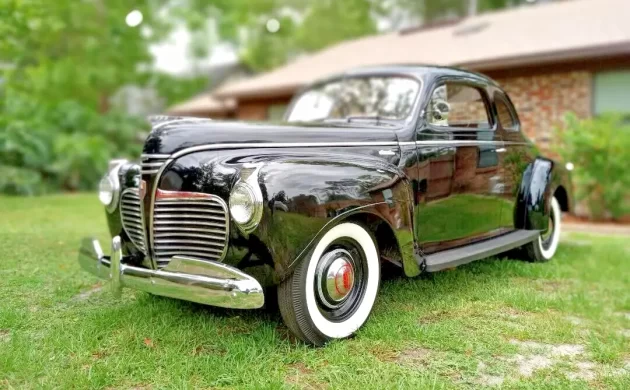
While we continue to discuss the merits and demerits of prewar cars and the market for such vehicles, there are a lot of fantastic automobiles out there that would make good entry-level purchases. Take for example this 1941 Plymouth business coupe for sale on eBay in Jacksonville, Florida. This presentable coupe is powered by one of the most underappreciated and well-engineered engines of its era and is one of the most beautiful prewar Plymouths as far as styling goes. If you were looking for a distinctive coupe that could be used as a daily driver once sorted out, then this Plymouth could be the car for you. Amazingly, this very original car with possibly 52,000 original miles on it has only been bid to $6,100 with three days left to go on the auction. Is this the right car for someone to get their start in the hobby with? Thanks to T.J. for finding this neat coupe!
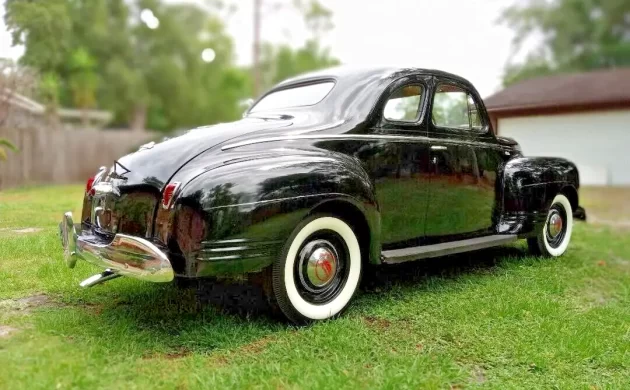
In contrast to many of the cars featured on these pages, this car comes with excellent documentation. The seller interestingly obtained the car’s Service Record from Chrysler Historical Records. That record provides the date and plant that the car was built in, the body and engine number, and that it was delivered the day after its official build date to the Armstrong-Wellborn dealership in Princeton, Indiana. The car will also come with an owner’s manual, service manual, wiring diagram, parts manual, and some dealer sales brochures.
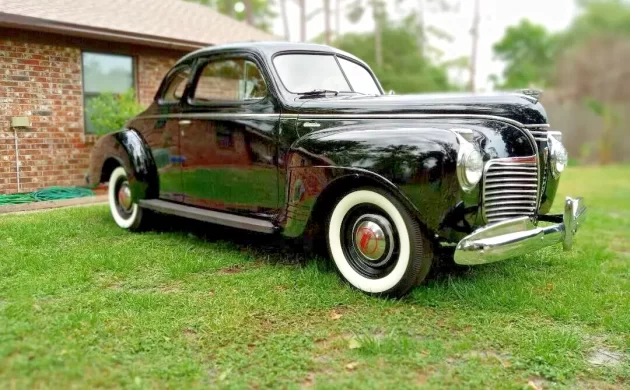
After faithfully serving its masters for 83 years, this Plymouth has managed to stay mostly stock. It has been treated to one repaint in the original black color and the bumpers have been rechromed. The body, frame, and floors are rust-free and in good condition. The interior is also original except for a new rubber mat, but the pictures reveal that it has some spots that show wear and staining. As for the car’s features, this black beauty came equipped with dual-tone air horns, factory running boards, bumper guards, a driver’s side view mirror, dual sun visors, and a deluxe heater.
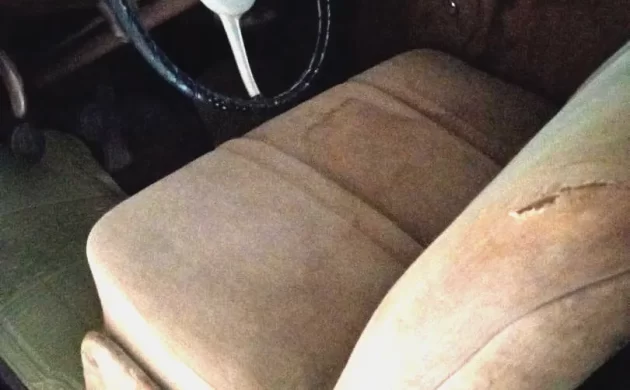
The car is not equipped with jump seats in the rear as some coupes were, as a business coupe was built to maximize the amount of room available for the purchaser to store their wares. This concept may need to be explained. Back before cell phones, the internet, and the rest of the tech that supercharges our lives, salespersons would travel from town to town displaying their wares to merchants and, hopefully, fill sales orders to be taken back to the factory. This personal but time-consuming touch is a part of life that was so common that manufacturers focused on their needs with special car models. This is one of them and is a remnant of a world we will likely never see again.
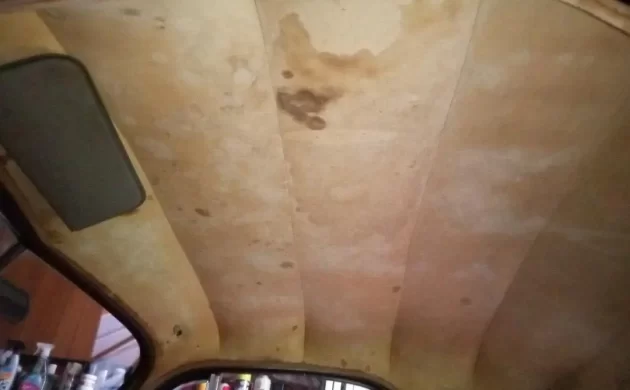
The rest of the history of the car is a mystery, however. The seller alludes to the car being in extended hibernation before recently being brought back to driving condition. These include repairs to the radiator and brakes, a new 6-volt battery, a new fuel tank and sending unit, a new vacuum wiper motor, and the items needed for a minor tune-up. It has also been shod with a new set of Coker wide whitewall tires.
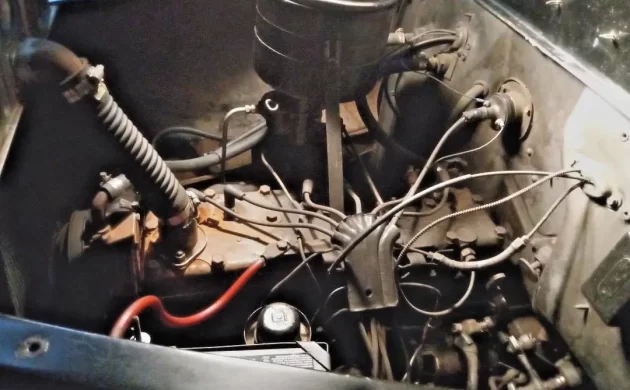
Under the hood, we see the numbers matching inline six-cylinder engine that still wears most of its original parts. From the oil bath air cleaner to the Ball and Ball carburetor, this car is as it left the factory in 1941. The only questionable part is the lighter paint on the firewall than the black on the rest of the car. My understanding is that the firewall should batch the exterior of the car. If anyone can explain why the firewall is lighter, please share it in the comments.
The car is said to run smoothly and shift with no issues. As for the mileage, the odometer reads 52,730 miles. The seller tells us that the true mileage is unknown for sales purposes. Given the condition of the car, the seller thinks this may be the correct mileage.
In all, it is a very intriguingly solid Plymouth with good documentation. If the car ends up selling for anything near the current bid, someone will be getting a bargain on a very desirable coupe. Plymouth made great cars both before and after the war, but the 1941 models just look better than the rest. Hopefully one of you takes this one home.





I assume this is from an estate. An elderly person lovingly cared for the car of his or her youth for years. Now they have passed, I am sure they would rest easier knowing someone else will love her to. Please respect this car, and the person who cared for it so long, and do not hot rod it. Keep the price down and a good car person will care for it, go for profit, and the car will soon be a fraction of what it once was, something that would not respect, what I assume, was the last ownrs wishes for the car. My guess is this was a quick buy from an uninterested family, and a quick flip for maximum profit. Pretty sad, really.
You’re making a lot of assumptions there. Why would lower selling price ensure that it goes to a better “car person?? Wouldn’t it better for the car to go to someone with the means to properly care for the car? Rather than someone who doesn’t have the money to store or maintain it correctly?
If I had a place to house it I’d be bidding for sure !!!!!
The firewall appears lighter because the picture was taken inside and the light from the camera made it brighter? Just my guess.
Our only family car during WW2 was a ’41 Plymouth 2-door sedan. Living in a city, Dad; (the only driver) didn’t put many miles on it but I don’t recall a single problem with the car. He traded it in 1950.
There’s another reason why your Dad didn’t put many miles on his ’41 Plymouth: rationing. Gasoline and tires were needed for the war effort, and pickin’s were pretty slim for the civilians.
My Dad traded his ’36 Plymouth on a new 1940 Plymouth two door (in light blue) and promptly took three buddies on a road trip from PA to CA. Right after the war, he and the ’40 made that trip again (think Route 66), this time with my Mom and my brother and me as passengers. Cars were in such high demand then that Dad sold the Plymouth in CA for more than he paid for it, and we went back home on the Santa Fe Super Chief train!!
20 miles away. I am so tempted on this site each week for something like this. I don’t know It appears to be 221 inches long. Need to measure my garage to see if this fits. the 18.5 feet would normally just fit, but of course, I don’t have all the free space I would like in the garage. Ugh.
221 inches long? Uh, no. Try 198.25 on a 117-inch wheelbase. The 221 figure is for the limousine model, which had 137-inch wheelbase.
I built an 18 ft canoe in a 16 1/2 ft garage. Just cut a hole in the back to get the extra room. Would make sense to do the same if this is the car of your dreams.
You have some serious problem solving skills, sir.
Pre-war cars were often stored for the duration of the war, and never revived afterwards. We have had serval at the museum where I volunteer. As to the trunk, it was not only usable to haul the salesman’s samples, it was also large enough to sleep in comfortably. It was often the life of a salesman to sleep in their cars because they were not always hotels, and they could be expensive.
My first car in 1951 was a 1941 Chevrolet business coupe. I removed the partition between the passenger compartment and the trunk and did indeed sleep in the car. My buddy and I took several extended road trips and being broke high school students my car was our hotel. It worked very well.
This model was my first car, in 1954. It was very reliable, with a top cruising
speed around 50 mph. Yes, it has a cavernous trunk. Quite a few teenagers can sneak into a drive in in that trunk.
Back in the day business coupes we’re used to run moonshine, especially the Fords with their flathead V8. The extra room in the trunk came in handy.
This would make a killer street rod.
I have almost the same exact car stored away. Mine is not a business coupe, has back seat, but has 46000. original miles. It was found in a garage in Froyd Montana, a one owner car and the owner had passed away many years ago, and someone found out about it and purchased from the widow. They took it to Sidney Montana and gave it a brand new black paint job and kept it in a heated garage and drove it to church on Sundays. The fellow was getting too old for it and I was lucky enough to be in the right spot and bought it. I turned down $19000. from too different offers, probably more than it would bring on eBay but it is a really nice car to drive in parades. I noticed I have a leaky wheel cylinder that will need to be fixed before I can drive it again. Thing of changing out the bias tires as the car wanders on our rutted pavement.
Please do not hotrod this.
IIRC, the coupe with the jump seats was called an “Opera Coupe”. During the late 1950’s, a friend had two high mileage 1940 Plymouths. The 1st was a gray 4 door sedan flood victim (eventually left disabled at the side of the road with a signed bill of sale stuck on the steering column). It was succeeded by a black coupe with jump seats. Unless jump seat passengers sat facing each other, the seats were only suitable for sitting dogs or Roman Busts. My friend’s ’40 Opera Coupe had apparently been well cared for by previous owners. It served him well needing only routine LOF and a tune-up. He sold it a year later for the same $50.00 he paid and then upgraded to a ’47 Ford coupe.
The seller’s car indeed would make a good daily driver or intro to the hobby. Chrysler Corp.’s flat head sixes were pretty much bullet proof, Based on age and low annual mileage (635 mi./yr. if accurate) dropping the pan and removing the build-up of accumulated sludge before the 1st oil and filter change is recommended.
Reason for gray firewall may be just road dirt. The rear part of the head is the same gray, with some red at front. My next car was a 1951 Plymouth convertible, better streamlined and heavier, with the same engine.
I have a 1935 de luxe coupe with rumble seat It has 52000original miles since new It has a soft and “whispering” engine In almost daily use Oh those Chrysler products !!!
Reserve not met
US $10,221.51
32 bidsEndedSaturday, 02:39 PM